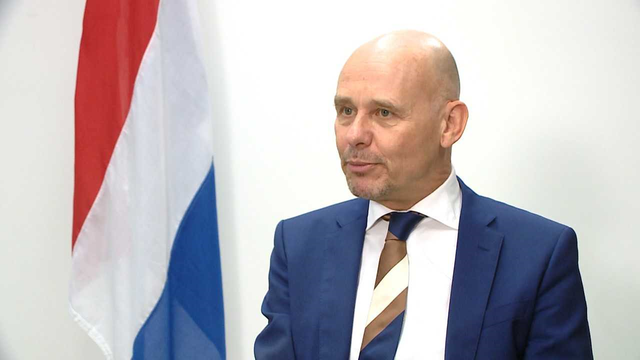Promoting alliance of governments, businesses, citizens between Viet Nam, Netherlands
VGP - Prime Minister Pham Minh Chinh’s upcoming official visit to the Netherlands is expected to promote the alliance of Dutch and Vietnamese governments, businesses, investors, knowledge institutes and engaged citizens, which is the key to a responsible and sustainable future for both countries.

Ambassador of the Kingdom of the Netherlands to Viet Nam Kees van Baar - Photo: VGP/Quang Thuong
In a recent interview with the VGP ahead of the PM's official visit to the Netherlands, Ambassador of the Kingdom of the Netherlands to Viet Nam Kees van Baar said that with the upcoming visit of PM and next year's celebration of the 50th anniversary of diplomatic relation, Viet Nam and the Netherlands find themselves in the heydays of our 400-year-old trade relations.
More specifically, it was only last week that the Dutch Minister of Foreign Trade and Development Cooperation Liesje Schreinemacher led a 3-day trade mission to Viet Nam and opened the venue alongside the Vietnamese PM.
The Green Economic Forum & Exhibition (GEFE) has proved to be a successful kick-start for Dutch-Vietnamese future cooperation in the fields of energy, high tech, sustainable mobility and innovation.
The visit is a confirmation that both countries are heading into the right direction. At one hand, the visit builds on and cements the bilateral success of GEFE, building a sustainable relationship together. At the other, it provides the opportunity to boost and improve the business environment between our countries and attract more investors.
Green, circular economy-key priorities in Viet Nam-Netherlands cooperation
According to Kees van Baar, trade between the Netherlands and Viet Nam is flourishing, even more so thanks to the EU-Viet Nam Free Trade Agreement. Right now, the Netherlands is Viet Nam's second largest EU trading partner and biggest EU investor.
Sixty per cent of all Vietnamese exports for the European market enter the continent via the Dutch port of Rotterdam. Over time, a bond between these cities' ports has emerged, which was strengthened by the visit of Rotterdam's Mayor Aboutaleb to Viet Nam in July this year.
Viet Nam has an unique opportunity now, thanks to the very favorable geo-economic circumstances, to take its economy and society to the next level. Its pivotal location in Southeast Asia is an asset in terms of logistics and economic growth, offering opportunities for Dutch companies.
Its function as a production hub and its growing consumer market are other reasons for Dutch businesses to come here and bring new knowledge, expertise, technologies and jobs to Viet Nam.
"The Netherlands wants to offer maximum support and facilitation with the goal to unlock the two countries' full bilateral potential", underscored the Ambassador.
In order to foster solid and sustainable economic relationship, the Netherlands support more connections between Dutch and Vietnamese small and medium-sized enterprises.
For instance, the 'Ready to Export' program implemented by the Dutch Business Association Viet Nam and Viet Nam Trade Promotion Agency, under the Ministry of Industry and Trade, play an important role.
In the near future, both countries will increasingly cooperate on shared commitment to net-zero emissions by 2050. Currently, the cooperation between Dutch companies and Vietnamese partners in support of a greener economy is booming.
Dutch companies are developing green local supply chains, for example in the Mekong Delta, and supporting the use of more renewable energy and circular economy concepts.
In term of key cooperation sectors and priorities between the two countries, it is important to highlight the essential role that the private sector plays in deepening our bilateral ties. The increased engagement of both countries' private sectors paves the way for an even stronger bilateral Dutch-Vietnamese relationship over time.
Viet Nam, Netherlands foster collaboration at multi-lateral forums
Regarding Viet Nam's efforts to realize international commitments, the Dutch Ambassador said that Viet Nam has made tremendous progress in the last decades when it comes to lifting millions out of poverty and providing access to healthcare and education for so many Vietnamese.
This is an important development, and demonstrates Viet Nam's commitment to social, economic and cultural rights. The Netherlands also has a very strong track record in civil and political rights.
Viet Nam was elected to the United Nations Human Rights Council (UNHRC) for the 2023-2025 tenure. The Netherlands is hoping to be elected to the UNHRC as well, for the period of 2024–2026.
"If that were to happen, the two countries would sit together on the UNHRC for two years. That is a good opportunity for us to exchange experiences, compare approaches to human rights, enter into sometimes difficult conversations and, ultimately, learn from each other", noted Kees van Baar.
